Garmin Fenix 7 review: Outdoor smartwatch that does not compromise
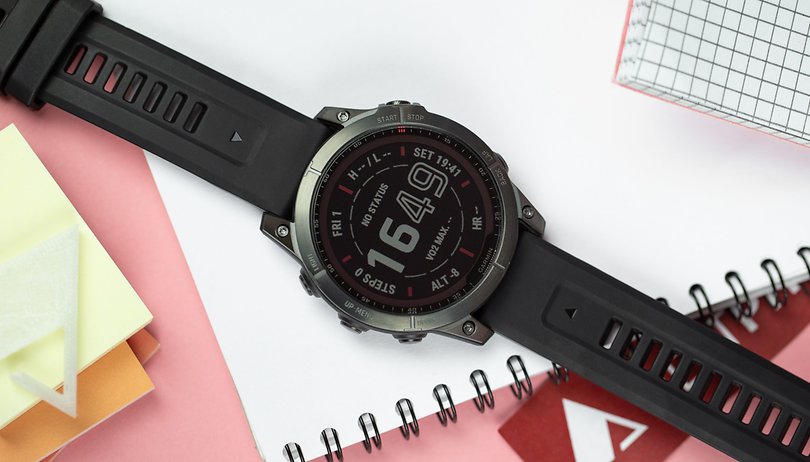

The Garmin Fenix 7 is an uncompromising smartwatch for outdoor athletes. In terms of tracking functions, the model has remained world-class for generations, and the design and operation are tried and tested. But does Garmin manage to keep up with the smart functions in this iteration? Find out in our review of the Garmin Fenix 7.
Good
- Extremely extensive tracking capabilities
- Great outdoor sports features
- High quality build
- Different sizes available
- Amazing battery life
- Huge accessory ecosystem
Bad
- Not quite the 'smart' watch
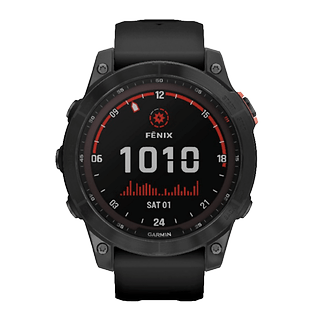
The Garmin Fenix 7 in a nutshell
The Garmin Fenix 7 is the ultimate watch for outdoor athletes. The range of functions and tracking options remain unparalleled among fitness smartwatches, while Garmin boasts a gigantic accessory ecosystem. The app presents the collected data in a smart and clear manner despite the huge number of information that it needs to crunch. Only in terms of smartwatch features does Garmin lag behind alternatives from Apple, Samsung and others.
The Garmin Fenix 7 is available in a number of different versions. The "ordinary" Fenix 7 comes with a 47-millimeter case, and there is also the Fenix 7S in a 42-millimeter format and the Fenix 7X in a 51-millimeter format. In addition, you can get all three sizes either as a standard version, with sapphire crystal or with sapphire crystal and solar panel invisibly integrated into the display. Garmin also offers each model anywhere from one to five color variants.
Garmin Fenix 7: Model overview and prices
| Garmin Fenix 7S (42 mm) | Garmin Fenix 7 (47 mm) | Garmin Fenix 7X (51 mm) | |
|---|---|---|---|
| Standard | $699.99 | $699.99 | - |
| Solar | $799.99 | $799.99 | $899.99 |
| Sapphire Solar | $899.99 | $899.99 | $999.99 |
It's also worth mentioning here that the sapphire versions come with 32 GB of integrated memory instead of 16 GB and have maps of the respective regions preinstalled, depending on where it is sold. The 7X also offers an integrated flashlight, now how about that?
Design & Display
The Garmin Fenix 7 is an outdoor smartwatch through and through. The distinctive case across all variants clearly reveals that intention. There are no compromises here, which also affects the display that can be considered as rudimentary by today's standards in favor of the battery life .
What I liked:
- Successful, striking design.
- Different sizes available.
- Display is always readable.
What I disliked:
- Unspectacular screen.
Our review unit was the almost indestructible Fenix 7 Sapphire Solar with a DLC-coated titanium case and sapphire crystal, for which Garmin charges a hefty $899.99 for. DLC stands for "Diamond-Like Carbon", which is a diamond-like coating that additionally protects the titanium case. Titanium is very hard but softer than stainless steel, for instance. Our review unit actually looked like new even under the magnifying glass after four weeks of everyday use which included gardening in dust and dirt.
The case of the Garmin Fenix 7 is bulky in any case and screams: I am a sports watch! You have to like that, and it also has to fit your wrist in terms of size. The medium-sized Fenix 7 fits me perfectly, for example, while the Fenix 7S is certainly the better choice for those who have narrower wrists. Despite its size, the Fenix 7 feels relatively light at 73 grams including the wristband and does not bother me during the day or at night.
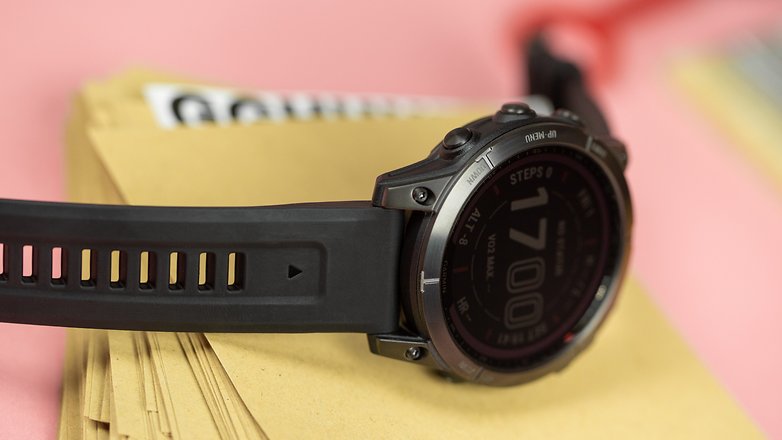
Around the casing of the Fenix 7, there are five buttons that have received a new bezel compared to the Fenix 6, making them less prone to accidental activation. The buttons have excellent pressure points. On the left side of the case, you'll find three buttons for light, up/menu, and down, respectively. The right sports two buttons for Start/Stop and Back/New Lap functions. However, the touchscreen is often more convenient to use than the buttons, but I will talk more about that later.
The transflective MIP screen of the Fenix 7 looks a bit out of date. A transflective screen features a reflective layer behind the LCD panel that reflects incoming light back through the panel. In practice, this means that the brighter it is, the brighter the display becomes. The Fenix 7's screen is perfectly legible even under bright sunlight. However, the display is not self-illuminating. In the dark, you have to either activate the backlight manually or via a wrist-twisting gesture, or simply set it to always-on.
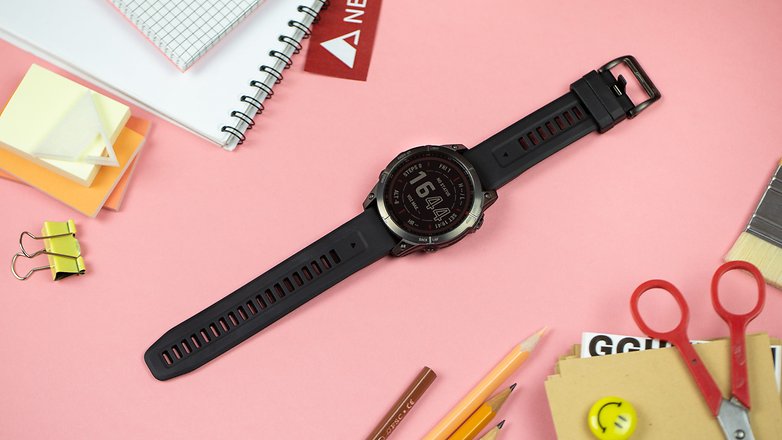
At the same time, the MIP technology (Memory in Pixel) ensures that the panel's energy consumption remains very low. However, the display also has a resolution of only 260 x 260 pixels (the Epix 2 has 416 x 416 pixels) and only offers 16 colors (Epix 2: 65,000 colors).
Together with the rather muted colors, the Fenix 7's screen carries the charm of an airplane instrument panel than that of a smartwatch in the year 2022. But you simply have to set your priorities right here: Choose from either a fantastic battery life or a great display, and for those who want the latter, there is always the Epix 2 as a compromise.
Operation and smart features
The Garmin Fenix 7 further improved upon a proven operating concept in some aspects. However, there is very little that is new to report in terms of smart functions, and thus the Fenix 7 falls further behind the competition from the likes of Samsung and Apple.
What I liked:
- Successful operating concept.
- Can also be operated completely via buttons.
- Menus and buttons are extremely customizable.
What I disliked:
- Smartwatch features not up to snuff.
- No LTE option available.
Those who have never used a Garmin smartwatch before will be overwhelmed by the range of available features at first. However, the interface is easily understood after a few days of use: Swiping up and down from the watch face or pressing the up and down buttons will let you navigate through a number of widgets that provide information about weather, completed workouts, notifications, calendar entries, compass direction, sunset, and more. The Start button takes you to the Workout menu, from where you can begin a workout of your choice.
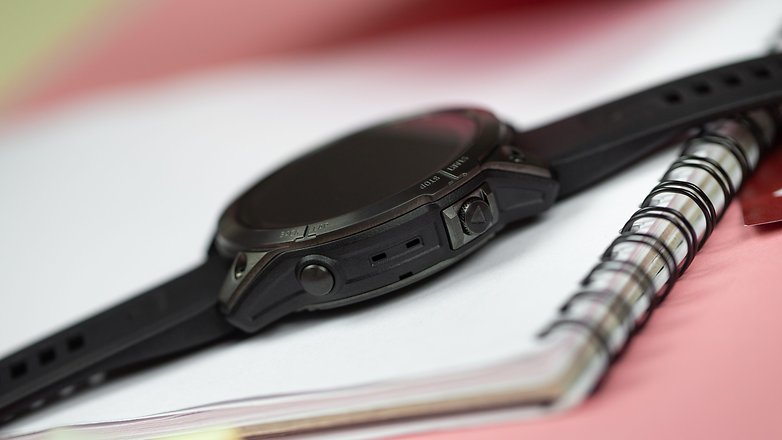
The menu button will launch (surprise!) the menu with quick settings and detailed settings. A long press with the light button calls up a few quick actions, such as locate your phone, save current location, activate DND mode, lock touchscreen, and so on. As described in the previous section, the five mechanical buttons can be used for all operations. You can use the Fenix 7 completely while wearing thick ski gloves, too!
However, the touchscreen is far better suited for many inputs, like being able to quickly note the repetitions and weights of the sets during weight training. What I like very much here is Garmin's flexible operating concept. For example, the factory settings lock the touchscreen during training to prevent incorrect or accidental input. However, you can of course change that through further customization. In fact, the entire selection and order of pretty much every single menu item, sports, shortcuts, or widgets that come with the Fenix 7 can be customized. You can also assign press-and-hold functions to selected buttons and define actions for shortcuts.
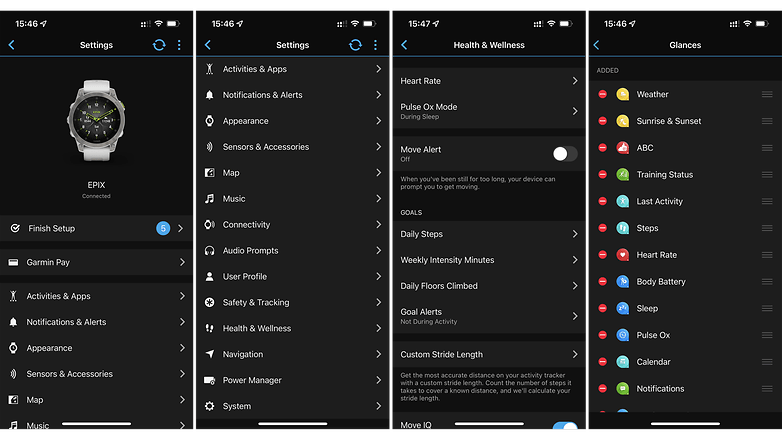
I also like this very much: All of the settings can be made via your smartphone. You don't have to trudge through long and confusing menus on the smartwatch, but configure your Fenix via the Garmin app itself. However, there is another app for watch faces and apps: the Garmin Connect IQ Store. Here you can find various apps like Spotify, Deezer, Komoot or Accuweather. So far, so smart!
However, it is always noticeable that the apps are not on the same level as those found in the likes of the Apple Watch. The installation does get stuck from time to time, and there might be moments when the feature does not work quite smoothly. Garmin's own payment service, Garmin Pay, only supports a handful of banks in Germany (where I reviewed it), and you cannot reply to notifications via the watch itself.
To cut a long story short: Rudimentary smartwatch features are there from the beginning, but don't expect the capabilities and polish of an Apple Watch or a Samsung Galaxy Watch here. It is also a real shame that Garmin's top model does not offer an LTE module even in 2022.
Tracking & Sensors
From detailed workout plans in the app to dozens of workout modes and integrated and optional sensors for just about every metric imaginable, the Garmin Fenix 7 is nearly unbeatable in its tracking features and sports modes.
What I liked:
- Incredibly diverse sport modes.
- Aaccurate GPS tracking and good map function.
- Wide selection of accessories from Garmin.
What I disliked:
- Nutrition tracking available only via MyFitnessPal.
The Garmin Fenix 7 offers the same incredibly wide range of functions as its sister watch, the Epix 2, which we already reviewed about a month back. Therefore, we will be rather brief concerning this point. You can find a more detailed description and evaluation of all tracking options in our review of the Garmin Epix 2.
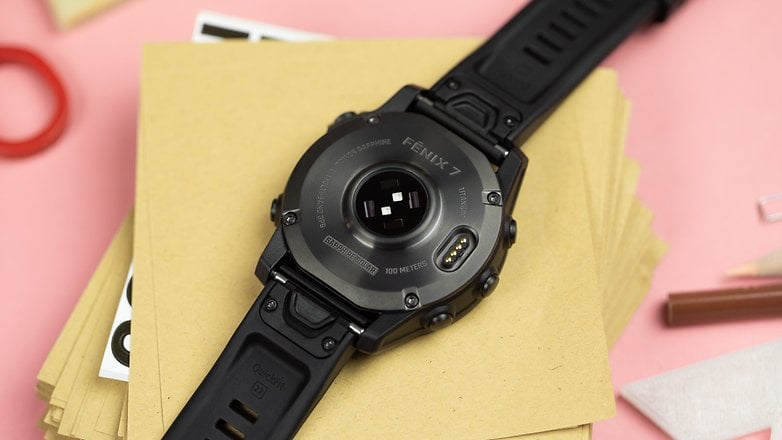
Outdoor sports & GPS
The Garmin Fenix 7 is capable of an enormous amount of sports, and is especially strong when it comes to outdoor activities. The integrated GPS module is very precise - and even more accurate in the Sapphire Solar variants thanks to multi-band GPS implementation.
However, we could not determine a significant difference between the normal GPS and the multi-band variant in reality. The integrated maps are practical, which you can use directly on the watch for navigation or optionally rely on third-party apps like Komoot to guide you through trails and the like.
And then, of course, there are the diverse tracking options for outdoor athletes. Apart from GPS, the optical heart rate measurement via the fourth-generation Elevate sensor should be mentioned here. Beyond that, however, Garmin's diverse accessories portfolio is also available to you, with all conceivable sensors especially for runners, cyclists or triathletes.
Garmin HRM Dual Heart Rate Monitor
Indoor sports & fitness
The Garmin Fenix 7 also offers numerous tracking modes for gym and other indoor activities, which can do far more than provide the recorded workouts their own name. During weight training, for example, the Fenix 7 recognizes which exercises you are currently performing and determines the load for the trained body regions after the workout.
At the same time, you can also create your own training plans and be guided through the exercises. HIIT workouts, on the other hand, focus on timers that whip you through your workout in AMRAP, EMOM or Tabata style.
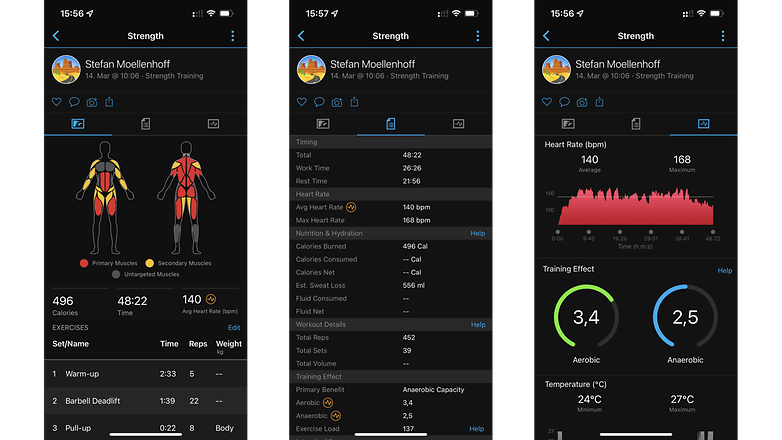
Sleep & Recovery
And yes: The Garmin Fenix 7 of course also offers a sleep tracking option with the usual determination of the different sleep phases. In addition, Garmin also determines your recovery state and quantifies it with the so-called "body battery", which is your body's own 'battery'. Lots of exercise and stress drain the 'battery', while adequate rest and good quality sleep replenish it.
Off to the sun!
A feature that is actually only available on the solar versions of the Garmin Fenix 7 is the measurement of the sun's intensity. Here, you can see how much sunlight you were exposed to over the course of the day and resolve to spend less time in front of the screen and more time in fresh air outdoors. This is not only healthy, but also extends the battery life of the Garmin Fenix 7 for the solar models.
Battery life
Battery life is the biggest strength of the Garmin Fenix 7 compared to its sister device, the Epix 2. The transflective display is much more energy-efficient in practice than the OLED screen of the Epix 2. Thus, I can get by for around two weeks during the review period, depending on my activities, although I admittedly did not see much sunlight during the week.
What I liked:
- Great battery life.
What I disliked:
- No wireless charging supported.
The Garmin Fenix 7 does not compromise when it comes to outdoor features, and that includes battery life. According to Garmin, the Fenix 7 offers three times longer battery life in standard operation compared to the (apart from the display) almost identical Epix 2, namely 18 instead of 6 days. The solar options even extend the runtime to 22 days, provided you spend three hours in the blazing sun every day. In reality, I usually get by with the Fenix 7 Solar Sapphire for 10 to 14 days, depending on how many sports activities were on the agenda.
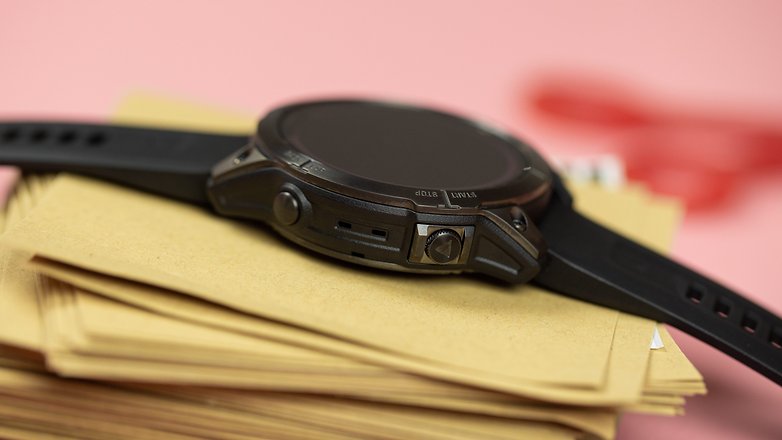
Charging is done via Garmin's proprietary charging cable, which the manufacturer uses for all of its smartwatches. Unfortunately, Garmin does not offer a wireless charging option in 2022, which is a shame, really.
Final verdict
The Garmin Fenix 7 is an uncompromising and impressively robust sports watch that fulfills every wish of outdoor athletes in particular, and it does that at ten times the fervor. The transflective display may not be as fancy as the Garmin Epix 2 or the competition, but it ensures an unrivalled battery life.
The bottom line is this: the Garmin Fenix 7 is the ultimate fitness watch for me, but it "only" remains as a very good sports smartwatch. The gap with the competition grows when it comes to smart features.
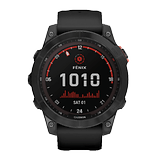






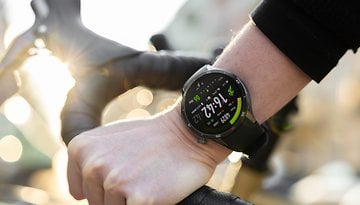
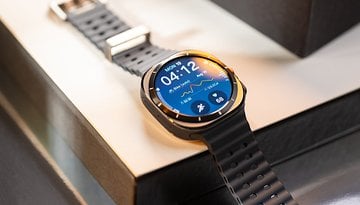
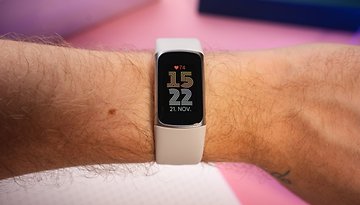
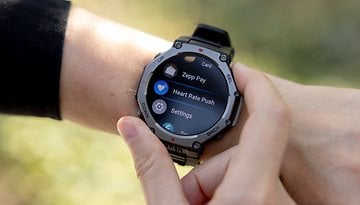
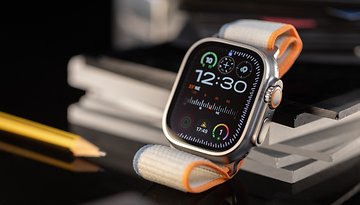









This watch is full of useful features I love it